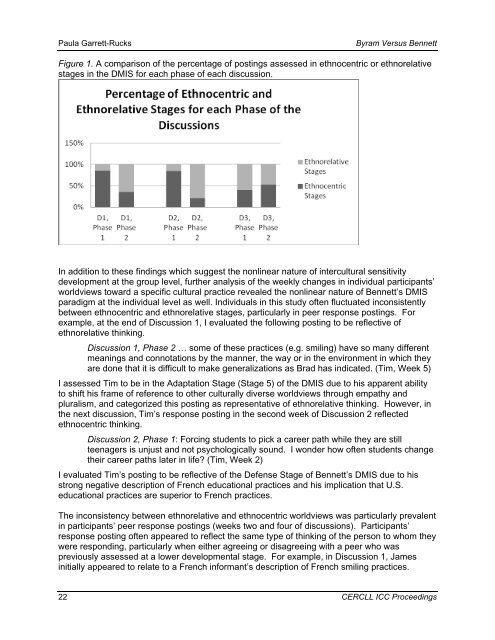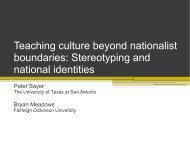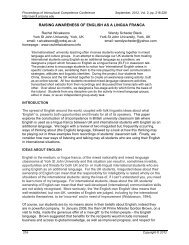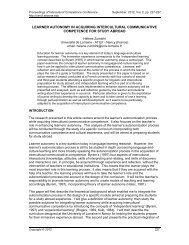BYRAM VERSUS BENNETT: DISCREPANCIES IN THE ... - CERCLL
BYRAM VERSUS BENNETT: DISCREPANCIES IN THE ... - CERCLL
BYRAM VERSUS BENNETT: DISCREPANCIES IN THE ... - CERCLL
Create successful ePaper yourself
Turn your PDF publications into a flip-book with our unique Google optimized e-Paper software.
Paula Garrett-Rucks Byram Versus Bennett<br />
Figure 1. A comparison of the percentage of postings assessed in ethnocentric or ethnorelative<br />
stages in the DMIS for each phase of each discussion.<br />
In addition to these findings which suggest the nonlinear nature of intercultural sensitivity<br />
development at the group level, further analysis of the weekly changes in individual participants’<br />
worldviews toward a specific cultural practice revealed the nonlinear nature of Bennett’s DMIS<br />
paradigm at the individual level as well. Individuals in this study often fluctuated inconsistently<br />
between ethnocentric and ethnorelative stages, particularly in peer response postings. For<br />
example, at the end of Discussion 1, I evaluated the following posting to be reflective of<br />
ethnorelative thinking.<br />
Discussion 1, Phase 2 … some of these practices (e.g. smiling) have so many different<br />
meanings and connotations by the manner, the way or in the environment in which they<br />
are done that it is difficult to make generalizations as Brad has indicated. (Tim, Week 5)<br />
I assessed Tim to be in the Adaptation Stage (Stage 5) of the DMIS due to his apparent ability<br />
to shift his frame of reference to other culturally diverse worldviews through empathy and<br />
pluralism, and categorized this posting as representative of ethnorelative thinking. However, in<br />
the next discussion, Tim’s response posting in the second week of Discussion 2 reflected<br />
ethnocentric thinking.<br />
Discussion 2, Phase 1: Forcing students to pick a career path while they are still<br />
teenagers is unjust and not psychologically sound. I wonder how often students change<br />
their career paths later in life? (Tim, Week 2)<br />
I evaluated Tim’s posting to be reflective of the Defense Stage of Bennett’s DMIS due to his<br />
strong negative description of French educational practices and his implication that U.S.<br />
educational practices are superior to French practices.<br />
The inconsistency between ethnorelative and ethnocentric worldviews was particularly prevalent<br />
in participants’ peer response postings (weeks two and four of discussions). Participants’<br />
response posting often appeared to reflect the same type of thinking of the person to whom they<br />
were responding, particularly when either agreeing or disagreeing with a peer who was<br />
previously assessed at a lower developmental stage. For example, in Discussion 1, James<br />
initially appeared to relate to a French informant’s description of French smiling practices.<br />
22 <strong>CERCLL</strong> ICC Proceedings





